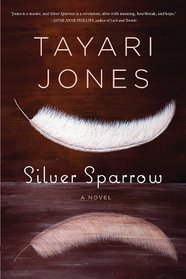 A version of this interview appeared in the June 2011 issue of The Practicing Writer.
A version of this interview appeared in the June 2011 issue of The Practicing Writer.
An Interview with Tayari Jones
by Erika Dreifus
Erika Dreifus (ED): Tayari, congratulations on the publication of your third novel, *Silver Sparrow*. The book’s acknowledgments page begins with an expression of thanks to a group of people “who read this story before it was a book, back when I was still afraid of it.” Please tell us more about this – what was it about the story that made you afraid?
Tayari Jones (TJ): Thank you, Erika for hosting me here and for giving *Silver Sparrow* such a close and careful read. I really appreciate it.
This story was a very hard one for me to write. My father is not a bigamist – I cannot say that enough – but there are aspects of the story that hit close to home. I have a sister with whom I do not share a mother. She is an amazing person and she means the world to me. But we did not grow up in the same home and we lead very different and separate lives. This story forced me to really take a look at the meaning of sisterhood and family. I had to get really honest with myself and look at my own life of relative privilege. The wonderful thing is that my sister, Maxine, was my biggest cheerleader in this. I showed her every draft.
ED: One of this book’s accomplishments, I think, is that it doesn’t necessarily force us to take sides, to choose between bigamist James Witherspoon’s “public” and “private” families. We can care (and worry) about all of the main characters: both daughters, both mothers, “Uncle” Raleigh, and even James himself. How intentional was this effect? Was there anything unusual that you had to do while writing or revising to sustain it?
TJ: I always tell my writing students that to make a good story, every character has to have a legitimate point. I never want to write a story where the moral choices are easy. I don’t think it makes for good writing and I think that, as a writer, we have to challenge our own assumptions and force ourselves to grow and become more compassionate. So, James lies to his wife about the fact that he has a second wife and child. But would we prefer that he not take care of that second child? Would he be more honorable were he a deadbeat? Hard questions make for good fiction.
ED: Issues of race, class, and gender permeate this novel. And there is this line: “They left early, as Marietta, Georgia, was not a good place to be colored after sundown; it was so racist that they had even lynched Jewish people.” Please tell us more about that line, and any history that inspired you to write it.
TJ: I was alluding to the lynching of Leo Frank in Marietta, Ga. I think that the history of anti-Semitism in the south is not really discussed when we talk about lynchings and hate crimes. It’s fascinating that many of the “charges” against Frank were similar to the same “charges” leveled against African American men who were lynched at the start of the 20th century – the murder of a white Christian woman. There is that overlapping in our histories. (Editor’s note: For more about the lynching of Leo Frank, see http://bit.ly/laz3Dp).
ED: As mentioned, *Silver Sparrow* is your third novel, and, like its predecessors, it is set in Atlanta. Please tell us about the pleasures and challenges for you in writing fiction that is set in that city.
TJ: I love the new south as a setting for fiction. History is alive in Atlanta and the characters are always aware of their place in history, but at the same time trying to transcend it. It makes for wonderful tension. In every novel I have written the characters muse on the legacy of Atlanta’s most famous son, Martin Luther King. In my second novel, the mother guilt trips her kids by chiding, “That’s not what Dr. King died for!” In *Silver Sparrow*, much of the action takes place within walking distance from Dr. King’s birthplace. It creates a unique mind space to know that someone died so that you may enjoy the most simple of pleasures. This history is creeping under the surface of everything I write, just as it creeps under the surface of the city itself.
ED: I’m still thinking about the book’s ending. I don’t want to give too much away, but may I confess that I found it deeply sad? As a writer, I find endings particularly challenging, and I’m wondering if this ending is the original and/or only ending you wrote for the novel. How did you know that this ending was “right”?
TJ: This was my third try at the ending. I knew what was going to happen, but I wasn’t sure which character should be allowed to tell it. I tried it with all the women in the story. I let James’s “legitimate”: wife tell it her way – but she just didn’t have the right tone, too much shame. Then I tried with his “legitimate” daughter. She was too distant. The ending belonged to Dana, his secret daughter. Of everyone in the story, she had to most to lose. She had the greatest investment, so I let her do the honors.
ED: Anything else you’d like us to know?
TJ: I would love to invite all your readers to come meet me on my book tour. I am hitting thirty cities and would be delighted to continue this conversation off line. http://www.tayarijones.com/appearances
ED: Thank you, Tayari!
Read an excerpt from *Silver Sparrow* at http://www.scribd.com/doc/51479619/Excerpt-From-Silver-Sparrow-by-Tayari-Jones, or go right ahead and buy the book at IndieBound.